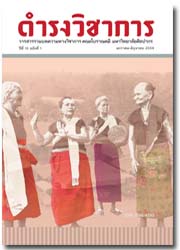The Influence of language on thought: The difference between Thai and Japanese Languages
Keywords:
Linguistic relativity, tense, cognitionAbstract
Language and cognition or thought are intimately related. The linguistic relativity hypothesis claims that language influences speakers’ thought. Thus, speakers of different languages tend to think differently. In contrast, speakers of similar languages tend to think in similar ways. The present study aims to analyze the relationship between language and thought about “time” of Japanese and Thai speakers. Japanese language carries tense-related inflections, whereas Thai language does not. If language influences thought, the tense system should affect time awareness in Japanese speakers. The study reveals that Japanese speakers pay more attention to time and also memorize time better than Thai speakers.
References
ราชบัณฑิตยสถาน, 2553. พจนานุกรมศัพท์ภาษาศาสตร์ (ภาษาศาสตร์ประยุกต์). กรุงเทพฯ: รุ่งศิลป์การพิมพ์.
Athanasopoulos P., 2009. “Cognitive Representation of Colour in Bilinguals: The Case of Greek Blues.” Language and Cognition 12: 83-95.
Athanasopoulos P., Damjanovic L., Krajciova A. & Sasaki M., 2011. “Representation of Colour Concepts in Bilingual Cognition: The Case of Japanese Blues.” Language and Cognition 14: 9-17.
Boroditsky L., 2001. “Does Language Shape Thought? Mandarin and English Speakers’ Conception of Time.” Cognitive Psychology 43: 1-22.
Boroditsky L., Fuhrman O. & McCormick K., 2011. “Do English and Mandarin Speakers Think About Time Differently?” Cognition 118: 123-129.
Chen J.-Y., 2007. “Do Chinese and English Speakers Think About Time Differently? Failure of Replicating Boroditsky (2001).” Cognition 104: 427–436.
Comrie B., 1985. Tense. Cambridge: Cambridge University Press.
Fuhrman O. & Boroditsky L., 2010. “Cross-Cultural Differences in Mental Representations of Time: Evidence From an Implicit Nonlinguistic Task.” Cognitive Science 34: 1430–1451.
Fuhrman O., McCormick K., Chen E., Jiang H., Shu D., Mao S. & Boroditsky L., 2011. “How Linguistic and Cultural Forces Shape Conceptions of Time: English and Mandarin Time in 3D.” Cognitive Science 35: 1305–1328.
Humboldt W. von., 1988. On Language: The Diversity of Human Language-structure and Its Influence on the Mental Development of Mankind. (Translated by P. Heath). Cambridge: Cambridge University Press.
January D. & Kako E., 2007. “Re–evaluating Evidence for the Linguistic Relativity Hypothesis: Response to Boroditsky (2001).” Cognition 104: 417–426.
Lucy J.A., 1992. Grammatical Categories and Cognition: A Case Study of the Linguistic Relativity Hypothesis. Cambridge: Cambridge University Press.
Sapir E., 1921. Language: An Introduction to the Study of Speech. New York: Harcourt, Brace & World, Inc.
Whorf B.L., 1956. Language, Thought, and Reality: Selected Writings of Benjamin Lee Whorf. J.B. Carroll (ed.). Cambridge, MA: MIT Press.
Downloads
Issue
Section
License
บทความนี้เป็นผลงานของข้าพเจ้าแต่เพียงผู้เดียว และ/หรือเป็นผลงานของข้าพเจ้าและผู้ร่วมงาน ตามชื่อที่ระบุในบทความจริง และเป็นผลงานที่มิได้ถูกนำเสนอหรือตีพิมพ์ที่ใดมาก่อน





